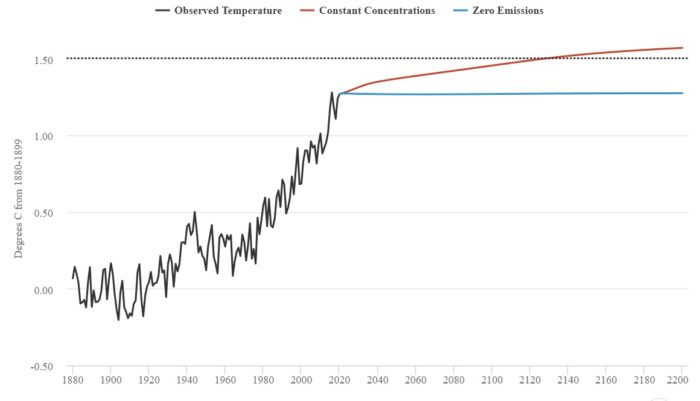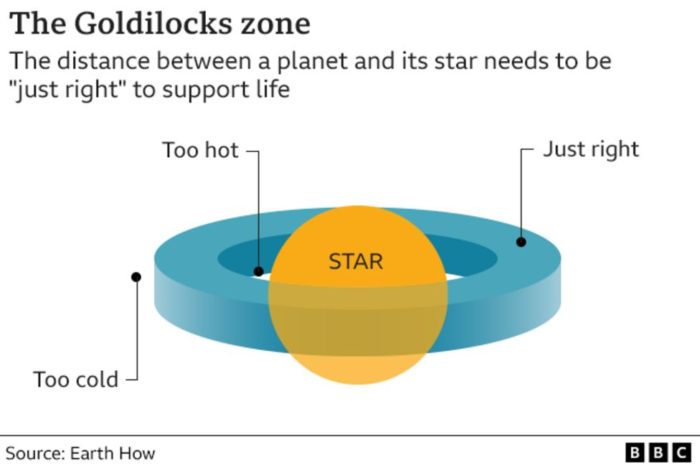Feb 28 2022
Some Good News on Climate Change
 One of the challenges of being a science communicator is keeping up to date. About 2.5 million scientific papers are published every year. Most of this is noise, preliminary studies, speculations, etc., but the end result is that most fields of science are constantly changing. This became very concrete for me while writing my next book (shameless plug alert), The Skeptics Guide to the Future, coming out this Fall. A big part of the book is examining cutting edge science and technology and then extrapolating it into the near, midterm, and far future. During the editing process there were constantly science news items that required small updates to the book. In fact I had to ask my editor, after the final submission, if I could please squeeze in one more update, and promised it would be the last one.
One of the challenges of being a science communicator is keeping up to date. About 2.5 million scientific papers are published every year. Most of this is noise, preliminary studies, speculations, etc., but the end result is that most fields of science are constantly changing. This became very concrete for me while writing my next book (shameless plug alert), The Skeptics Guide to the Future, coming out this Fall. A big part of the book is examining cutting edge science and technology and then extrapolating it into the near, midterm, and far future. During the editing process there were constantly science news items that required small updates to the book. In fact I had to ask my editor, after the final submission, if I could please squeeze in one more update, and promised it would be the last one.
If you are not paying obsessive attention to a particular field of science, it’s really difficult to keep completely up to date. There is also a substantial delay, sometimes decades, between changes to the consensus of scientific opinion based on new evidence and when that new consensus filters down to the public’s general consciousness. Sometime the delay is forever, as outdated ideas persist indefinitely. This is especially true if an outdated scientific conclusion has a rhetorical utility, either in marketing a product or promoting a political ideology. We figured out a quarter of a century ago that consuming anti-oxidants were not good for your health, but don’t hold your breath for the supplement industry to alter their promotion of anti-oxidant products.
One idea that has become a standard part of the conversation on climate change is that once CO2 is released into the atmosphere it will cause continued warming for decades. So, the argument goes, even if we stopped all release of greenhouse gases today, full net-zero, the climate would continue to warm for many decades, perhaps a century or longer. That was the scientific consensus, although it was never a very firm one, just the best estimate based on existing evidence. That conclusion, however, started to crack as early as 2008, and by 2020 was updated with new and better science. This is a rare instance of good climate news. In an interview, climate scientist Michael Mann said:
“This really is true,” he said. “It’s a dramatic change in the paradigm that has been lost on many who cover this issue, perhaps because it hasn’t been well explained by the scientific community. It’s an important development that is still under appreciated. It’s definitely the scientific consensus now that warming stabilizes quickly, within 10 years, of emissions going to zero.”

 Think of the number 23. What just happened in your brain? You have some sense of how large a number 23 is. You are reading, so probably the first representation was the written form, and then you may have said “twenty-three” to yourself. You probably didn’t imagine exactly 23 objects laid out, but could have gotten there if you thought long enough. Perhaps you chunked it in your mind – imagining two rows of 10 followed by a row of three. You may have also thought of three weeks plus an extra weekend, or perhaps, staying on the verbal side, phrases like “23 skidoo”.
Think of the number 23. What just happened in your brain? You have some sense of how large a number 23 is. You are reading, so probably the first representation was the written form, and then you may have said “twenty-three” to yourself. You probably didn’t imagine exactly 23 objects laid out, but could have gotten there if you thought long enough. Perhaps you chunked it in your mind – imagining two rows of 10 followed by a row of three. You may have also thought of three weeks plus an extra weekend, or perhaps, staying on the verbal side, phrases like “23 skidoo”. “Nanotechnology” is one of the buzzwords of our time. It is used the exact same way “space age technology” was used in the last few decades of the 20th century, and to a lesser extent even to today. It creates a marketing halo of advanced cutting-edge technology, but it’s not clear what it actually means. The term has loosely been used to refer to any tech that involves any component that has one dimension which is between 1-100 nanometers (nm). If only one dimension is in this size range then we are dealing with a nanosheet, and if one of the remaining two dimensions is a lot longer than the other this is a nanoribbon. If two dimensions are in the nano range then that is a nanofiber (long) or nanorod (short), and if it’s hollow then a nanotube. If all three dimensions are between 1-100 nm then that is a nanoparticle. The nanoparticles themselves could be anything. Since many natural substances have features in this size range, it’s easy to invoke the “nanotechnology” buzzword. For this reason synthetic machines that operate on the nanoscale have been dubbed “molecular nanotechnology” to distinguish this from the now overused regular nanotechnology label.
“Nanotechnology” is one of the buzzwords of our time. It is used the exact same way “space age technology” was used in the last few decades of the 20th century, and to a lesser extent even to today. It creates a marketing halo of advanced cutting-edge technology, but it’s not clear what it actually means. The term has loosely been used to refer to any tech that involves any component that has one dimension which is between 1-100 nanometers (nm). If only one dimension is in this size range then we are dealing with a nanosheet, and if one of the remaining two dimensions is a lot longer than the other this is a nanoribbon. If two dimensions are in the nano range then that is a nanofiber (long) or nanorod (short), and if it’s hollow then a nanotube. If all three dimensions are between 1-100 nm then that is a nanoparticle. The nanoparticles themselves could be anything. Since many natural substances have features in this size range, it’s easy to invoke the “nanotechnology” buzzword. For this reason synthetic machines that operate on the nanoscale have been dubbed “molecular nanotechnology” to distinguish this from the now overused regular nanotechnology label. Rapidly advancing computer technology has greatly enhanced our lives and had ripple effects throughout many industries. I essentially lived through the computer and internet revolution, and in fact each stage of my life is marked by the state of computer technology at that time. You can also easily date movies in a contemporary setting by the computer and cell phone technology in use. But one downside to rapid advance is so-called orphaned technology. You may, for example use a piece of software that you know really well and feel is the perfect compromise of usability and functionality. Upgrades may be too expensive for you, or simply not desired. But at some point the company stops supporting the software, because they have moved on to later versions and would rather just have their customers upgrade. Without upgrades the software slowly becomes unusable – vulnerable to hacks and not compatible with other software and hardware.
Rapidly advancing computer technology has greatly enhanced our lives and had ripple effects throughout many industries. I essentially lived through the computer and internet revolution, and in fact each stage of my life is marked by the state of computer technology at that time. You can also easily date movies in a contemporary setting by the computer and cell phone technology in use. But one downside to rapid advance is so-called orphaned technology. You may, for example use a piece of software that you know really well and feel is the perfect compromise of usability and functionality. Upgrades may be too expensive for you, or simply not desired. But at some point the company stops supporting the software, because they have moved on to later versions and would rather just have their customers upgrade. Without upgrades the software slowly becomes unusable – vulnerable to hacks and not compatible with other software and hardware. Most people I know, whether personally or as my patients, want to take positive steps to improve their health and quality of life. Unfortunately, many people who make a decision to get healthier rely on information in the popular culture and being promoted by the self-help industry. Much of this information is wrong or misleading. When people want to improve their diet, they often tell me they only eat organic whole foods, or perhaps they go paleo or raw if they are really motivated. But these changes are worthless – just expensive distractions.
Most people I know, whether personally or as my patients, want to take positive steps to improve their health and quality of life. Unfortunately, many people who make a decision to get healthier rely on information in the popular culture and being promoted by the self-help industry. Much of this information is wrong or misleading. When people want to improve their diet, they often tell me they only eat organic whole foods, or perhaps they go paleo or raw if they are really motivated. But these changes are worthless – just expensive distractions. The “coming hydrogen economy” never came, and may never come, because of the critical problem of hydrogen storage. Hydrogen can be a great fuel because it is light and burns clean with oxygen, creating only water as a byproduct. But these features of hydrogen, while appealing, are not enough. The angle that popular reporting on such scientific advances rarely take is that, in order to be useful, hydrogen fuel (or any similar technology) must work as an entire system. We therefore have to imagine the entire industrial cycle of a hydrogen economy – where will the hydrogen come from, how will it be stored, how will it be distributed, how will it be burned, what are all the byproducts of this entire system, and what other materials are required to make it work? Every piece of the system must be scalable, safe, cost competitive, efficient, and convenient. Further, and significant new infrastructure requirements will present a hurdle to adoption. The potential number of deal-killer “gotchas” are enormous.
The “coming hydrogen economy” never came, and may never come, because of the critical problem of hydrogen storage. Hydrogen can be a great fuel because it is light and burns clean with oxygen, creating only water as a byproduct. But these features of hydrogen, while appealing, are not enough. The angle that popular reporting on such scientific advances rarely take is that, in order to be useful, hydrogen fuel (or any similar technology) must work as an entire system. We therefore have to imagine the entire industrial cycle of a hydrogen economy – where will the hydrogen come from, how will it be stored, how will it be distributed, how will it be burned, what are all the byproducts of this entire system, and what other materials are required to make it work? Every piece of the system must be scalable, safe, cost competitive, efficient, and convenient. Further, and significant new infrastructure requirements will present a hurdle to adoption. The potential number of deal-killer “gotchas” are enormous. Astronomers
Astronomers  There is
There is  In my opinion one of the most encouraging future technologies that we are developing today is hacking the nervous system through electromagnetic recording and stimulation. Nervous system signals are ultimately electrical, which is convenient because we have an entire mature technology based on controlling the flow of electricity. We also have increasingly powerful computers and software algorithms to both read and recreate these electrical signals. The actual limiting factor with this technology at present is the hardware – the electrodes we use to interface with nervous tissue. As this technology advances, so do our applications.
In my opinion one of the most encouraging future technologies that we are developing today is hacking the nervous system through electromagnetic recording and stimulation. Nervous system signals are ultimately electrical, which is convenient because we have an entire mature technology based on controlling the flow of electricity. We also have increasingly powerful computers and software algorithms to both read and recreate these electrical signals. The actual limiting factor with this technology at present is the hardware – the electrodes we use to interface with nervous tissue. As this technology advances, so do our applications. The latest controversy over Joe Rogan and Spotify is a symptom of a long-standing trend, exacerbated by social media but not caused by it. The problem is with the algorithms used by media outlets to determine what to include on their platform.
The latest controversy over Joe Rogan and Spotify is a symptom of a long-standing trend, exacerbated by social media but not caused by it. The problem is with the algorithms used by media outlets to determine what to include on their platform.




